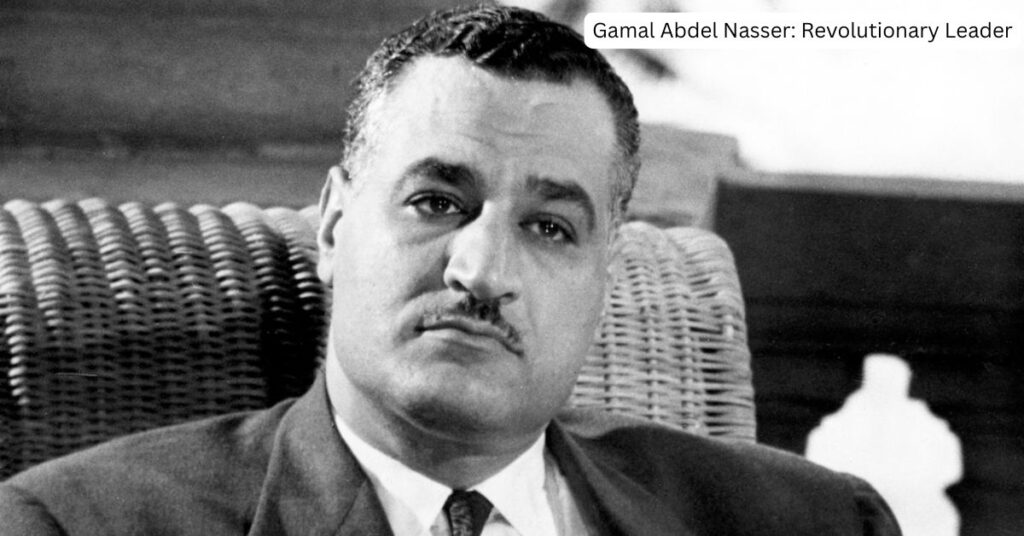Introduction
Gamal Abdel Nasser remains one of the most influential figures in modern Middle Eastern history. As the second President of Egypt, he not only reshaped his nation’s political landscape but also inspired revolutionary movements across the Arab world. His vision of Arab unity, social reform, and resistance against colonial powers cemented his legacy as a revolutionary leader whose impact extended far beyond Egypt’s borders.
Early Life and Military Career
Born on January 15, 1918, in Alexandria, Nasser came from a modest background. His early experiences with inequality and foreign domination deeply shaped his worldview. After enrolling in the Royal Military Academy, Nasser pursued a career in the Egyptian army, where he grew increasingly disillusioned with corruption, monarchy, and the lingering influence of British colonial rule.
During his military service, Nasser and a group of like-minded officers formed the Free Officers Movement, a secret organization dedicated to ending monarchy and achieving national independence. This group would soon change the course of Egyptian history.
The 1952 Revolution
On July 23, 1952, the Free Officers led a coup that toppled King Farouk and abolished Egypt’s monarchy. Though General Muhammad Naguib initially became president, it was Nasser who emerged as the true architect of Egypt’s new political direction. By 1954, Nasser assumed leadership and established himself as the face of a new era for Egypt—an era rooted in nationalism, social justice, and independence.
Nasser’s Presidency and Reforms
When Nasser officially became president in 1956, he introduced sweeping reforms that transformed Egyptian society:
- Land Reforms: Redistribution of agricultural land to reduce the power of large landowners and improve conditions for peasants.
- Economic Modernization: Development of state-owned industries and expansion of infrastructure projects.
- Education and Social Policies: Increased access to free education and health services to reduce social inequality.
These reforms, while controversial, symbolized his commitment to uplifting the lives of ordinary Egyptians.
The Suez Crisis and International Recognition
Nasser’s boldest move came in July 1956 when he nationalized the Suez Canal, a vital waterway previously controlled by British and French interests. This decision triggered the Suez Crisis, where Britain, France, and Israel launched a military intervention against Egypt.
Though militarily challenged, Nasser emerged as a hero when international pressure forced the invaders to withdraw. The crisis transformed him into a global symbol of anti-imperialism and strengthened his role as a leader of the Non-Aligned Movement, alongside figures like Jawaharlal Nehru and Josip Broz Tito.
Champion of Arab Nationalism
Beyond Egypt, Nasser’s vision of Pan-Arabism resonated across the region. He sought to unite Arab nations under a single identity free from Western domination. In 1958, Egypt and Syria formed the United Arab Republic, a short-lived experiment in Arab unity that demonstrated both the possibilities and challenges of regional integration.
Although the union dissolved in 1961, Nasser’s calls for Arab solidarity inspired generations of leaders and movements throughout the Middle East.
Challenges and Setbacks
Despite his achievements, Nasser’s leadership faced major obstacles. His centralized economic policies sometimes stifled growth, and his authoritarian governance drew criticism. The greatest setback came during the Six-Day War of 1967, when Israel defeated Egypt and its allies, capturing the Sinai Peninsula. This military loss deeply affected Nasser’s prestige, though he retained popular support until his death.
Legacy
Gamal Abdel Nasser passed away on September 28, 1970, but his influence continues to echo in Egypt and across the Arab world. He is remembered as:
- A symbol of independence against colonial and foreign powers.
- A social reformer who sought equality for Egypt’s poor.
- A visionary of Arab unity, whose dream of solidarity still inspires political discourse.
Though not without flaws, Nasser’s leadership defined an era of revolutionary change and gave Egypt a prominent role in international affairs.
Conclusion
Gamal Abdel Nasser was more than a president—he was a revolutionary leader who embodied the aspirations of his people. His bold policies, defiance of imperial powers, and vision for Arab unity earned him a place among the most influential leaders of the 20th century. While debates over his methods and legacy persist, Nasser’s role in shaping modern Egypt and inspiring Arab nationalism remains undeniable.





